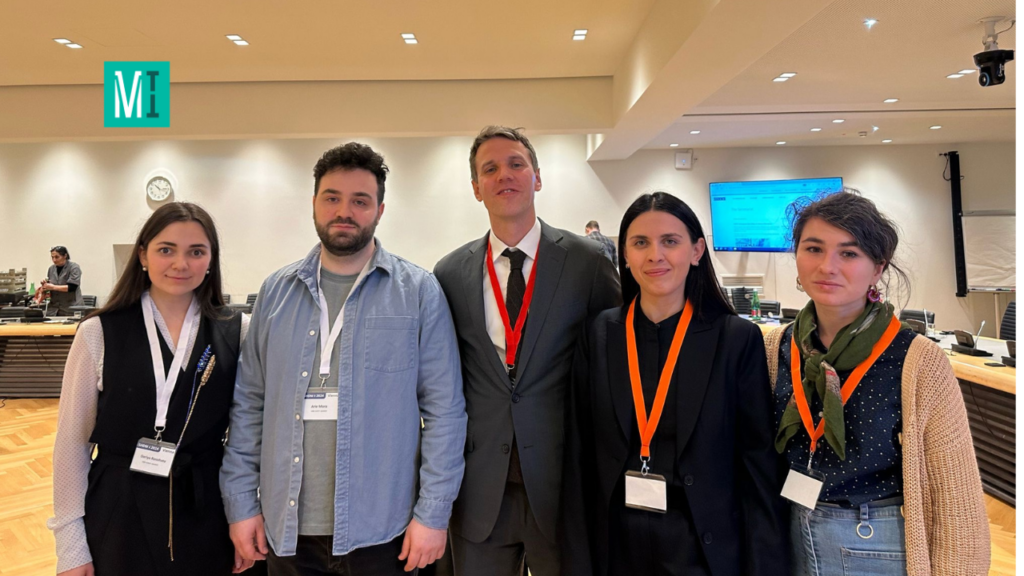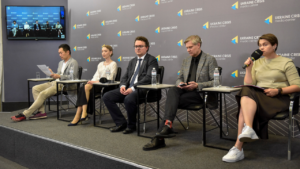The MIHR presented to the OSCE the results of the analysis on the rights and motivation of victims of war crimes

The Media Initiative for Human Rights continues its advocacy visit to the OSCE within the Supplementary Human Dimension Meetings framework. Analyst Lyubov Smachylo and Head of the War Crimes Courts Monitoring Department Oksana Rasulova participated in the event “Challenges of establishing justice in Ukraine for victims of war crimes and their motivation at the national level,” organized by the MIHR.
Christopher Russell, OSCE Rule of Law Officer, moderated the discussion. Based on the MIHR analysis and research by Jurfem and ULAG, Mr. Russell outlined numerous problems with the rights, status, and motivation of war crimes victims to participate in justice.
One of the most painful procedural problems is that the Ukrainian justice system treats the status of a victim of a war crime as if it were a victim of any other crime. According to Oksana Rasulova, this approach needs to be changed, and people subjected to a special type of crime should have access to special assistance and support from the state.
— In particular, they need a safe physical and communication space,” added the MIHR expert. “For example, victims do not know what is happening with their cases, what to expect at hearings and when, and do not have a safe space in the courtroom, although they are very vulnerable at this moment.
Oksana Rasulova cited one example when the victim in the case of Russian paratrooper Andrii Medvedev, who is being tried for allegedly imitating the shooting of civilians in Irpin in March 2022, came to the scheduled hearing and waited for five hours for it to begin until the court’s working day was over. The situation repeated itself several times. And although the case is still being heard, the victim is now demotivated and disappointed in the Ukrainian justice system. In fact, due to the influence of time and organizational shortcomings of justice, MIHR’s analytics are called the “Cooling Effect.“

The victims’ motivation is also influenced by whether the sentences lead to actual results when the perpetrators serve their sentences. Currently, the vast majority of war crimes cases in Ukrainian courts are tried in absentia, i.e., in absentia. It is mainly impossible to execute such sentences, and this also demotivates people to participate in the proceedings, says Lyubov Smachylo, an analyst at the MIHR:
— In our case, the convicts are in Russia, Belarus, on the temporarily occupied territory of Ukraine or at the front. That is, Ukrainian law enforcement can’t reach them. Alternatively, third countries, where the convicts will later go, could join in executing the sentences. But we don’t see this mechanism working at the moment.
She also mentioned the experience of other countries in dealing with international crimes, such as Bosnia and Herzegovina and Georgia. There, victims had high hopes for the international justice system rather than the national one. However, it failed to meet their expectations, having a negative impact on them.
The discussion touched on expectations and ensuring the rights of victims participating in the trial. Daria Rosokhata, legal analyst at Jurfem, voiced one of the most pressing problems. According to her, sometimes Ukrainian law enforcement officers disclose personal data of victims of sexual violence during the conflict, interrogate the same traumatized person several times, and are not guided by a human-centered approach. She is convinced that this threatens to retraumatize and stigmatize such people in society.
— For example, we have seen situations where communities knew the names of victims of sexual violence committed during the armed conflict, and this threatened their safety,” emphasizes Daria Rosokhata. “This approach is definitely not human-centered. Neither is repeated interrogation or interrogation of a female victim of sexual violence by a male law enforcement officer.
Experts from Yurfem and the MIHR are convinced that a human-centered approach will improve the effectiveness of work with victims.
Arie Mora from ULAG also spoke about the practical problems and challenges that Ukraine’s overloaded law enforcement system faces.
Currently, the Office of the Prosecutor General reports more than 130,000 registered war crimes, and no national system, according to human rights activists, can handle such a large number of cases. Mora reminded that prosecutors and investigators do not have sufficient resources to work appropriately with victims. Because of this, the interests of such people are not a priority for them. The ULAG expert also points out that victims should be proactive in moving the case forward, but he calls for other means to encourage the investigation to work.

Moreover, law enforcement officers do not always understand the psychological state of victims who, due to their experiences, have neither the physical nor the moral strength to mask their involvement in the process. First of all, this concerns people who experienced sexual violence during the war.
The newly created Coordination Center for Victims and Witnesses could partially solve these problems. However, Arie Mora and her colleagues do not yet see a significant positive impact of this center on victims’ situations. This is in no small part due to the fact that the Coordination Center operates as a referral system, where the procedures are not streamlined, and there are no clear algorithms.
In their conversation summary, participants stressed the importance of addressing justice concerns at all levels, not just national ones. The idea of justice and the work that needs to be done to achieve it should be promoted internationally, in particular through the creation of a tribunal that will hold Russia accountable for crimes committed in Ukraine.






